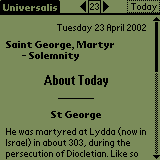


The Liturgy of the Hours
The Liturgy of the Hours (also known as the Divine Office) is the richest single prayer resource of the Christian Church. It provides prayers, psalms and meditation for every hour of every day. It has existed from the earliest times, to fulfil the Lord's command to pray without ceasing. According to the Apostolic Constitution Canticum Laudis “The purpose of the Divine Office is to sanctify the day and all human activity. The Office is... the prayer not only of the clergy but of the whole People of God”.
And no-one has ever heard of it. You can go to church for years and never hear it mentioned, still less recommended: and this despite the fact that the clergy are under an obligation to recite the Divine Office daily. This state of affairs is as grotesque as it is unacceptable.
Universalis exists to put this right by providing the Liturgy of the Hours in electronic form. For it, I have made a new translation of the Psalms (from the Latin), programmed all the calendrical calculations for the various countries that we serve, and built the infrastructure that allows content to be delivered as Web pages, on hand-held computers, and even on mobile telephones.
Of course Universalis is a work in progress. It could hardly be otherwise, given that its printed equivalent is 6,000 pages spread over three or four volumes; but already the psalms and readings for the four most important hours, Lauds, Vespers, Compline and the Office of Readings, are collated automatically for each day and made available who anyone who wishes to use them.
And people come: the site has 2,300 visits a day and serves a million pages a month. They come from all over the world, and from all denominations – Catholics, Anglicans, Presbyterians, Methodists, Lutherans, and Anabaptists. Poor students use Universalis because it is free; travellers use it because they cannot carry the heavy books; the blind and half-blind use it because they can enlarge the text or have it spoken to them electronically; and one person was using it from Belgrade as the NATO bombs began to fall.
(You can read a longer article about Universalis here).
